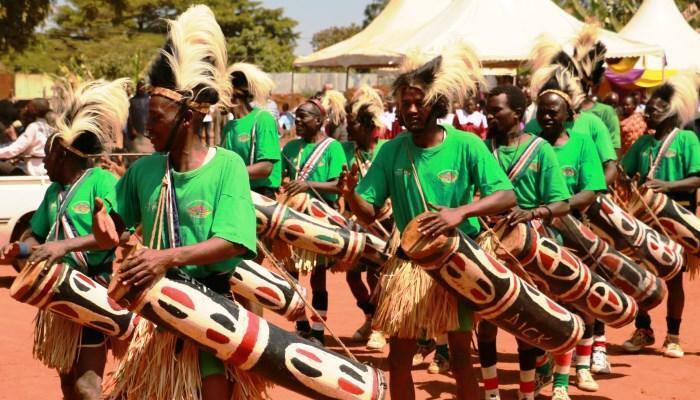Gĩchuka Speakers
The Chuka People are located in Tharaka Nithi County of Kenya. According to the Kenya National Bureau of Statistics (2009) Tharaka Nithi County has a total population of 356,330 people (male - 48% and female -52%). Majority of the residents in Tharaka Nithi County comprise the Tharaka, Mwimbi, Muthambi and Chuka. It is not known how many people Speak Gĩchuka language since the National census classified the Chuka among the Meru language cluster. According to ethnologue (1980) the estimated population of the Chuka language speakers was 70,000 and the population was increasing. Today we can project the population of the Chuka People to be about 160,000.
Gĩchuka language is intelligible with the neighbouring languages. Ethnologue places the lexical similarity of Gĩchuka with Embu [ebu] to be 73%, 70% with Gikuyu [kik], 67% with Kimîîru [mer], and 63% with Kikamba [kam].
Location of the Chuka People
Chuka Town is Located on the Eastern slopes Mount Kenya, and it is about 44 Km from Embu Town which is to the South and 54 Km from Meru, which is to the North. The town is mostly an agricultural and business centre hosting several institutions such as Chuka University, and Presbyterian Teachers College – Rubate. Chuka is home to the famous Chuka drummers and dancers troupe.
Cultural Heritage
The Chuka community have had a long history of peaceful coexistence with her neighbours namely the Mũthambi to the North, the Tharaka to the East, and the Embu and Mbeere to the South. The myths have it that the Chuka and Tharaka people descended from the same ancestral father called Ciambugi, and his two wives; Ciambandi and Ciangoi. The wives separated and Ciabandi moved eastwards and bore the Tharaka people, while Ciangoi remained behind in Chuka and she bore the Chuka people.
Among the Chuka, male circumcision is still one of the most significant rituals in their culture. This rite of passage transforms a young man into an adult, giving him the right to marry, acquire wealth and property, and make independent decisions. The circumcised men were the ones who were allowed to participate in the Mwĩnjĩro dance.

Chuka Drummers perform during the Dedication of Gospel of Luke in Gichuka on 28th January 2017 at Chuka PCEA Grounds.
The Chuka people are known for their dramatic dances that are sometimes acrobatic. Here is the Mwinjĩro dance by Chuka Drummers.
Just like other Bantus, a bride price in the form of cows, goats is paid by the groom's family to the bride's family before marriage. A man is considered the head of the household and has defined roles and duties. Women tend to the farms and raise the children.
Traditionally, the Chuka had a strong clan (family) system that controlled the basic operations of all families within the clan. Some of the clans include Ĩgandaĩ, Ĩtarĩ na Mũrobo, Mũcekwa, Ĩgankida, Thona, Mũrũrũ, Marũgũ na Mbũtĩ, Ĩthe Mbugi na Njoguni, Nkui na Gakũya, Ĩgoki na Ũmũtho, Mũnari, among others. After the independence of Kenya in 1964, the Chuka people divided their land according to their clans.
Although the clan system has nearly vanished, the extended family still retains a very powerful influence on the lives of individual family members. The entire family is tasked with making important life decisions on behalf of each family member, such as during marriage ceremonies, burrials and inheritance of property.
The Chuka are agriculturalists, utilising the favourable soil and climate of the eastern slopes of Mount Kenya. The cash crops grown in Chuka region are mainly coffee and tea. Subsistence crops include maize, beans and bananas. The Chuka People are slowly embracing commercial dairy production. Generally the Chuka people are vey industious, generous and hospitable.
Food
The traditional food for the Chuka people was, mũthere, nyoni, mũthũra, ikwa, gĩtwero, kaboco, kĩbĩrĩ and many more.
Wisdom of the Chuka people
The Chuka people have very rich proverbs and sayings which store some of their wisdom. You can access some of the proverbs ad sayings on our facebook page. Click here
to visit our facebook proverbs page.
References
- Ethnologue (1980) www.ethnologue.com/language/cuh
- Kenya National Bureau of Statistics (2012)
